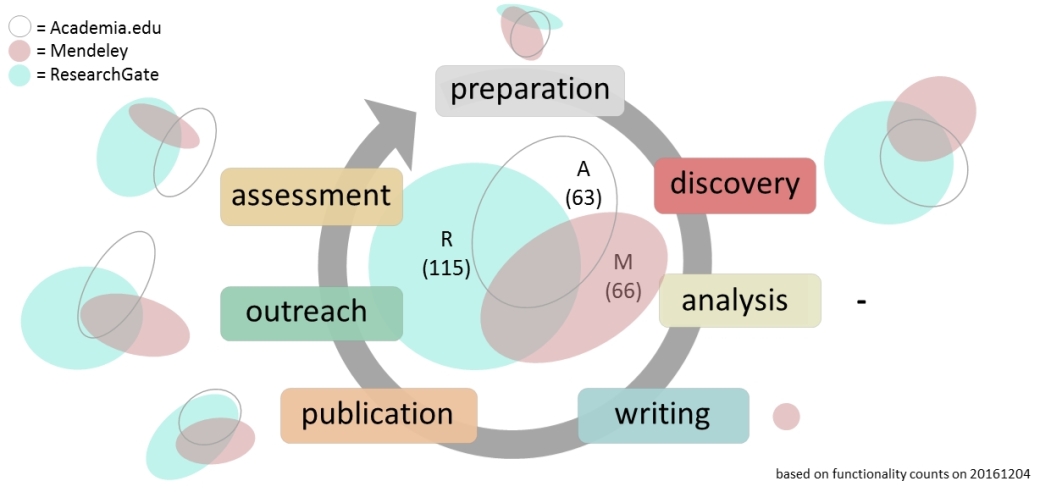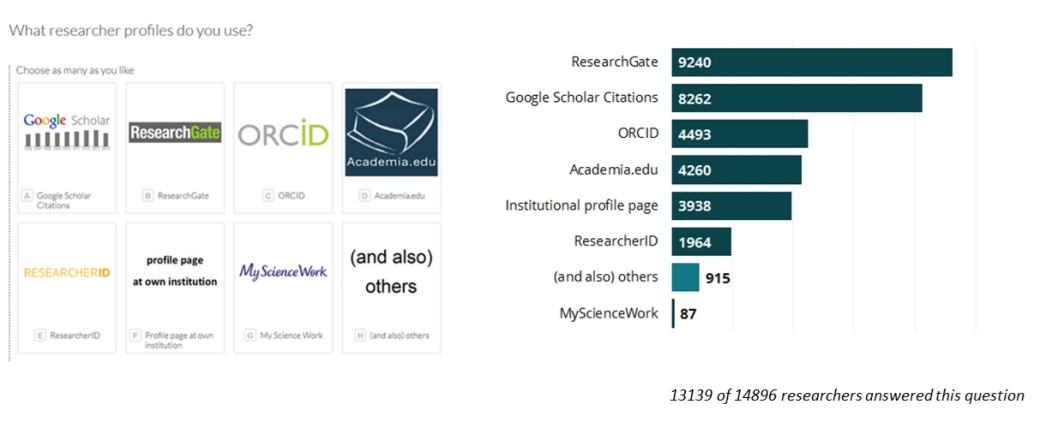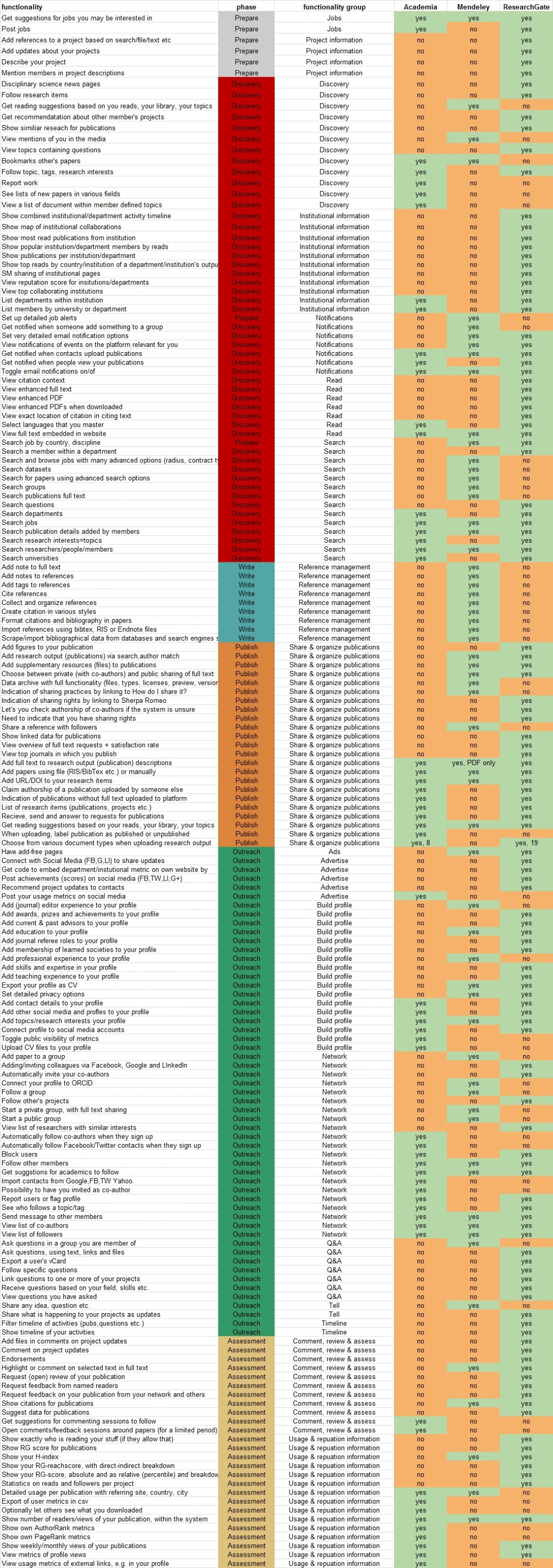Academic social networks – the Swiss Army Knives of scholarly communication
On December 7, 2016, at the STM Innovations Seminar we gave a presentation
(available from Figshare) on academic social networks. For this, we
looked at the functionalities and usage of three of the major networks (ResearchGate, Mendeley and Academia.edu) and also offered some thoughts on the values and choices at play both in offering and using such platforms.
Functionalities of academic social networks
Academic social networks support activities across the research
cycle, from getting job suggestions, sharing and reading full-text
papers to following use of your research output within the system. We
looked at detailed functionalities offered by ResearchGate, Mendeley and
Academia.edu (Appendix 1) and mapped these against seven phases of the research workflow (Figure 1).
In total, we identified 170 functionalities, of which 17 were shared
by all three platforms. The largest overlap between ResearchGate and
Academia lies in functionalities for discovery and publication (a.o.
sharing of papers), while for outreach and assessment, these two
platforms have many functionalities that do not overlap. Some examples
of unique functionalities include publication sessions (time-limited feedback sessions on one of your full text papers) and making metrics public or private in Academia, and Q&A’s, ‘enhanced’ full-text views and downloads and the possibility to add additional resources to publications in ResearchGate. Mendeley is the only platform offering reference management and specific functionality for data storage, according to FAIR principles. A detailed list of all functionalities identified can be found in Appendix 1.

Figure 1. Overlap of functionalities of ResearchGate, Mendeley and Academia in seven phases of the research cycle
identified 31 core research activities. If the functionalities of
ResearchGate, Mendeley and Academia are mapped against these 31
activities (Figure 2), it becomes apparent that Mendeley offers the most
complete support of discovery, which ResearchGate supports
archiving/sharing of the widest spectrum of research output. All three
platforms support outreach and assessment activities, including impact
metrics.

Figure 2. Mapping of functionalities of ResearchGate, Mendeley and Academia against 31 activities across the research worflow
Despite offering 170 distinct functionalities between them,
there are still important functionalities that are missing from the
three major academic social networks. For a large part, these center
around integration with other platforms and services:
- Connect to ORCID (only in Mendeley), import from ORCID
- Show third party altmetrics
- Export your publication list (only in Mendeley)
- Automatically show and use clickable DOIs (only in Mendeley)
- Automatically link to research output/object versions at initial publication platforms (only in Mendeley)
major platforms. Most notably among these are activities in the analysis
phase, where functionality to share notebooks and protocols might be a
useful addition, as would text mining of full-text publications on the
platform. And while Mendeley offers extensive reference management
options, support for collaborative writing is currently not available on
any of the three platforms.
If you build it, will they come?
Providers of academic social networks clearly aim to offer
researchers a broad range of functionalities to support their research
workflow. But which of these functionalities are used by which
researchers? For that, we looked at the data of 15K researchers from our
recent survey on scholarly communication tool usage.
Firstly, looking at the question on which researcher profiles people
use (Figure 3), it is apparent that of the preselected options,
ResearchGate is the most popular. This is despite the factor that
overall Academia.edu report a much higher number of accounts (46M
compared to 11M for ResearchGate). One possible explanation for this
discrepancy could be a high number of lapsed or passive accounts on
Academia.edu – possibly set up by students.

Figure 3. Survey question and responses (researchers only) on use of researcher profiles. For interactive version see http://dashboard101innovations.silk.co/page/Profiles
in different disciplines (Figure 4), ResearchGate proves to be dominant
in the ‘hard’ sciences, while Academia is more popular in Arts &
Humanities and to a lesser extent in Social Sciences and Economics.
Whether this is due to the specific functionalities the platforms offer,
the effect of what one’s peers are using or even to the name of the
platforms (with researchers from disciplines identifying more with the
term ‘Research’ than ‘Academia’ or vice versa) is up for debate.

Figure 4. Percentage of researchers in a given disicpline that indicate using ResearchGate and/or Academia (survey data)
Our survey results also give some indication as to what
researchers are using academic social networks for. We had ResearchGate
and Mendeley as preset answer options in a number of questions about
different research activities, allowing a quantitative comparison of the
use of these platforms for these specific activities (Figure 5). These
results show that of these activities, ResearchGate is most often used
as researcher profile, followed by its use for getting access to
publications and sharing publications, respectively. Mendeley was
included as preset answer option for different activities; of these, it
is most often used for research management, following by
reading/viewing/annotating and searching for literature/data. The
results also show that for each activity it was presented as a preset
option for, ResearchGate is used by most often by postdocs, while
Mendeley is predominantly used by PhD students. Please note that these
results do not allow a direct comparison between ResearchGate and
Mendeley, except for the fourth activity in both charts: getting
alerts/recommendations.

Figure 5. Percentage of researchers using ResearchGate / Mendeley for selected research activities (survey data)
survey respondents could also indicate any other tools they use for a
specific activity. This allows us to check for which other activities
people use any of the academic social networks, and plot these against
the activities these platforms offer functionalities for. The results
are shown in Figure 6 and indicate that, in addition to activities
supported by the respective platforms, people also carry out activities
on social networks for which there are no dedicated functionalities.
Some examples are using Academia and ResearchGate for reference
management, and sharing all kinds of research outputs, including formats
not specifically supported by the respective networks. Some people
even indicate using Mendeley for analysis – we would love to find out
what type of research they are carrying out!
For much more and alternative data on use of these platforms’ functionalities please read the analyses by Ortega (2016), based on scraping millions of pages in these systems.

Figure 6. Research ctivities people report using ResearchGate, Mendeley and/or Academia for (survey data)
Academic social networks are built for and used by many
researchers for many different activities. But what kind of scholarly
communication do they support? At Force11, the Scholarly Communications Working Group (of which we both are steering committee members) has been working on formulating principles for scholarly communication that encourage open, equitable, sustainable, and research- and culture-led (as opposed to technology- and business-model led) scholarschip.
This requires, among other things, that research objects and all
information about them can be freely shared among different platforms,
and not be locked into any one platform. While Mendeley has an API they claim is fully open,
both ResearchGate and Academia are essentially closed systems. For
example, all metrics remain inside the system (though Academia offers an
export to csv that we could not get working) and by uploading full text
to ResearchGate you grant them the right to change your PDFs (e.g. by
adding links to cited articles that are also in ResearchGate).
There are platforms that operate from a different perspective,
allowing a more open flow of research objects. Some examples are the Open Science Framework, F1000 (with F1000 Workspace), ScienceOpen, Humanities Commons and GitHub
(with some geared more towards specific disciplines). Not all platforms
support all the same activities as ResearchGate and Academia (Figure
7), and there are marked differences in the level of support for
activities: sharing a bit of code through ResearchGate is almost
incomparable to the full range of options for this at GitHub. All these
platforms pose alternatives for researchers wanting to conduct and share
their research in a truly open manner.

Figure 7. Alternative platforms that support research in multiple phases of the research cycle
Some additional readings on academic social networks and their use:
- Academic Social Networks: Collaborative Environments or Diogenes Clubs? José Luis Ortega, The Scholarly Kitchen, December 8, 2016.
- Do academic social networks share academics’ interests? David Matthews , Times Higher Education. April 7, 2016.
- The role of ego in academic profile services: Comparing Google scholar, ResearchGate, Mendeley, and ResearcherID. Alberto Martín-Martín, Enrique Orduna-Malea and Emilio Delgado López-Cózar, LSE Impact Blog, March 4, 2016.
- Emerging reputation mechanisms for scholars.
David Nicholas, Eti Herman, Hamid R. Jamali, European Commission Joint
Research Centre, Institute for Prospective Technological Studies (Report
EUR 27174 EN) 2015. http://doi.org/10.2791/891948
List of functionalities within ResearchGate, Mendeley and Academia (per
20161204). A live, updated version of this table can be found here: http://tinyurl.com/ACMERGfunctions.

Appendix 1. Detailed functionalities of ResearchGate, Mendeley and Academia per 20161204. Live, updated version at http://tinyurl.com/ACMERGfunctions
Academic social networks – the Swiss Army Knives of scholarly communication | Innovations in Scholarly Communication
No comments:
Post a Comment